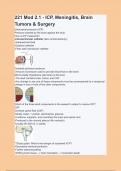Exam (elaborations)
221 Mod 2.1 - ICP, Meningitis, Brain Tumors & Surgery Questions with 100% Actual correct answers | verified | latest update | Graded A+ | Already Passed | Complete Solution
- Course
- Institution
221 Mod 2.1 - ICP, Meningitis, Brain Tumors & Surgery Questions with 100% Actual correct answers | verified | latest update | Graded A+ | Already Passed | Complete Solution
[Show more]



